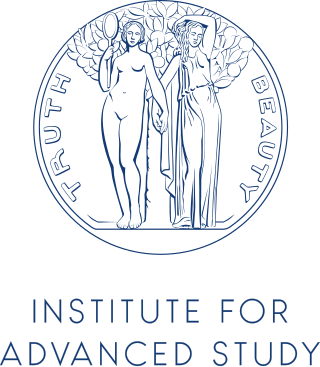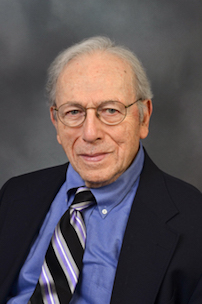Related Research Articles

The Institute for Advanced Study (IAS) is an independent center for theoretical research and intellectual inquiry located in Princeton, New Jersey. It has served as the academic home of internationally preeminent scholars, including Albert Einstein, J. Robert Oppenheimer, Hermann Weyl, John von Neumann, and Kurt Gödel, many of whom had emigrated from Europe to the United States.
William Julius Wilson is an American sociologist, a professor at Harvard University, and an author of works on urban sociology, race, and class issues. Laureate of the National Medal of Science, he served as the 80th President of the American Sociological Association, was a member of numerous national boards and commissions. He identified the importance of neighborhood effects and demonstrated how limited employment opportunities and weakened institutional resources exacerbated poverty within American inner-city neighborhoods.

Clare Hall is a constituent college of the University of Cambridge, England. Founded in 1966 by Clare College, Clare Hall is a college for advanced study, admitting only postgraduate students alongside postdoctoral researchers and fellows. It was established to serve as an Institute of Advanced Studies and has slowly grown and developed into a full constituent college.
The Wolf Prize in Physics is awarded once a year by the Wolf Foundation in Israel. It is one of the six Wolf Prizes established by the Foundation and awarded since 1978; the others are in Agriculture, Chemistry, Mathematics, Medicine and Arts.

The Herbert D. Katz Center for Advanced Judaic Studies at the University of Pennsylvania—commonly called the Katz Center—is a postdoctoral research center devoted to the study of Jewish history and civilization.

The University of Hamburg is a public research university in Hamburg, Germany. It was founded on 28 March 1919 by combining the previous General Lecture System, the Hamburg Colonial Institute, and the Academic College. The main campus is located in the central district of Rotherbaum, with affiliated institutes and research centres distributed around the city-state. Seven Nobel Prize winners and one Wolf Prize winner are affiliated with UHH.
John Harnad is a Hungarian-born Canadian mathematical physicist. He did his undergraduate studies at McGill University and his doctorate at the University of Oxford under the supervision of John C. Taylor. His research is on integrable systems, gauge theory and random matrices.

The College of Natural Sciences at The University of Texas at Austin offers 10 Bachelor of Arts majors, 42 Bachelor of Science majors, and 20 graduate programs to more than 11,000 undergraduates and 1,400 graduate students. The college employs over 370 faculty. Many of the programs are consistently ranked in the top ten nationally, according to U.S. News & World Report (2019), including: Analytical Chemistry (4th), Applied Math (9th), Artificial Intelligence (8th), Computer Science (10th), Computing Systems (8th), Computing Theory (7th), Cosmology/Relativity/Gravity (10th), Ecology, Evolution and Behavior (6th), Mathematics Analysis (7th), Plasma Physics (3rd), Programming Language (8th), and Topology (8th). It was established in 1883.
Caroline Walker Bynum, FBA is a Medieval scholar from the United States. She is a University Professor emerita at Columbia University and Professor emerita of Western Medieval History at the Institute for Advanced Study in Princeton, New Jersey. She was the first woman to be appointed University Professor at Columbia. She is former Dean of Columbia's School of General Studies, served as president of the American Historical Association in 1996, and President of the Medieval Academy of America in 1997–1998.

George Daniel Mostow was an American mathematician, renowned for his contributions to Lie theory. He was the Henry Ford II (emeritus) Professor of Mathematics at Yale University, a member of the National Academy of Sciences, the 49th president of the American Mathematical Society (1987–1988), and a trustee of the Institute for Advanced Study from 1982 to 1992.
Gene Ezia Robinson is an American entomologist, Director of the Carl R. Woese Institute for Genomic Biology and National Academy of Sciences member. He pioneered the application of genomics to the study of social behavior and led the effort to sequence the honey bee genome. On February 10, 2009, his research was famously featured in an episode of The Colbert Report whose eponymous host referred to the honey Dr. Robinson sent him as "pharmaceutical-grade hive jive".

James Daniel "BJ" Bjorken is an American theoretical physicist. He was a Putnam Fellow in 1954, received a BS in physics from MIT in 1956, and obtained his PhD from Stanford University in 1959. He was a visiting scholar at the Institute for Advanced Study in the fall of 1962. Bjorken is emeritus professor in the SLAC Theory Group at the Stanford Linear Accelerator Center, and was a member of the Theory Department of the Fermi National Accelerator Laboratory (1979–1989).
Swapan Kumar Pati is an Indian quantum chemist, a professor of the department of chemistry at the Jawaharlal Nehru Centre for Advanced Scientific Research and the head of the Quantum Theory Molecules to Materials Group at the institute. He is known for his studies on electronic optical and magnetic phenomena in molecular systems and is an elected fellow of the Indian Academy of Sciences, National Academy of Sciences, India and The World Academy of Sciences. The Council of Scientific and Industrial Research, the apex agency of the Government of India for scientific research, awarded him the Shanti Swarup Bhatnagar Prize for Science and Technology, one of the highest Indian science awards, in 2010, for his contributions to chemical sciences.
Govindasamy Mugesh is an Indian inorganic and physical chemist, a professor and the head of the Mugesh Laboratory attached to the department of Inorganic and Physical Chemistry at the Indian Institute of Science. He is known for his studies on the mechanism of thyroid hormone action and is an elected fellow of the Indian Academy of Sciences, Indian National Science Academy, Royal Society of Chemistry and the National Academy of Sciences, India. The Council of Scientific and Industrial Research, the apex agency of the Government of India for scientific research, awarded him the Shanti Swarup Bhatnagar Prize for Science and Technology, one of the highest Indian science awards, in 2012, for his contributions to chemical sciences. In 2019, he was awarded the Infosys Prize in Physical Sciences for his seminal work in the chemical synthesis of small molecules and nanomaterials for biomedical applications.

The Princeton University Department of Mathematics is an academic department at Princeton University. Founded in 1760, the department has trained some of the world's most renowned and internationally recognized scholars of mathematics. Notable individuals affiliated with the department include John Nash, former faculty member and winner of the 1994 Nobel Memorial Prize in Economic Sciences; Alan Turing, who received his doctorate from the department; and Albert Einstein who frequently gave lectures at Princeton and had an office in the building. Fields Medalists associated with the department include Manjul Bhargava, Charles Fefferman, Gerd Faltings, Michael Freedman, Elon Lindenstrauss, Andrei Okounkov, Terence Tao, William Thurston, Akshay Venkatesh, and Edward Witten. Many other Princeton mathematicians are noteworthy, including Ralph Fox, Donald C. Spencer, John R. Stallings, Norman Steenrod, John Tate, John Tukey, Arthur Wightman, and Andrew Wiles.
The Princeton University Department of Physics is an academic department dedicated to research and teaching at Princeton University. The associated faculty members, researchers, and students have been recognized for their research contributions, having been awarded 19 Nobel Prizes, four National Medals of Science, and two Wolf Prizes in Physics. Notable professors, researchers, and graduate students affiliated with the department include Richard Phillips Feynman, Joseph H. Taylor, Jim Peebles, Eugene P. Wigner, and John von Neumann. In addition, the department offers degree programs for bachelor's students (A.B.) and doctoral students (Ph.D.).
Ruth Alexandra Britto-Pacumio is an American mathematical physicist whose research topics include black holes, Yang–Mills theory, and the theory of Feynman integrals; with Freddy Cachazo, Bo Feng, and Edward Witten she is one of the namesakes of the BCFW recursion relations for computing scattering amplitudes. She is an associate professor in mathematics and theoretical physics at Trinity College Dublin, and is also affiliated with the Institut de physique théorique - IPhT Saclay.